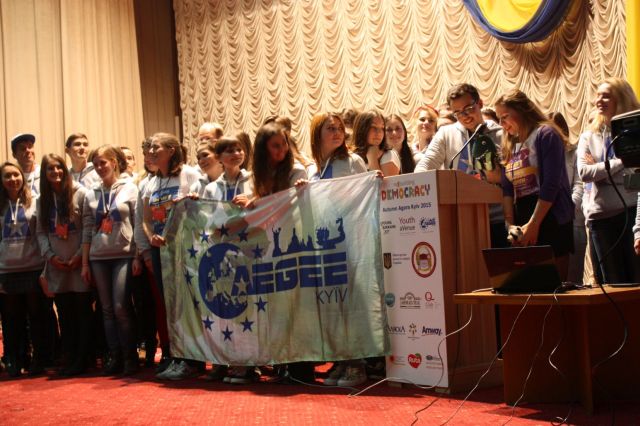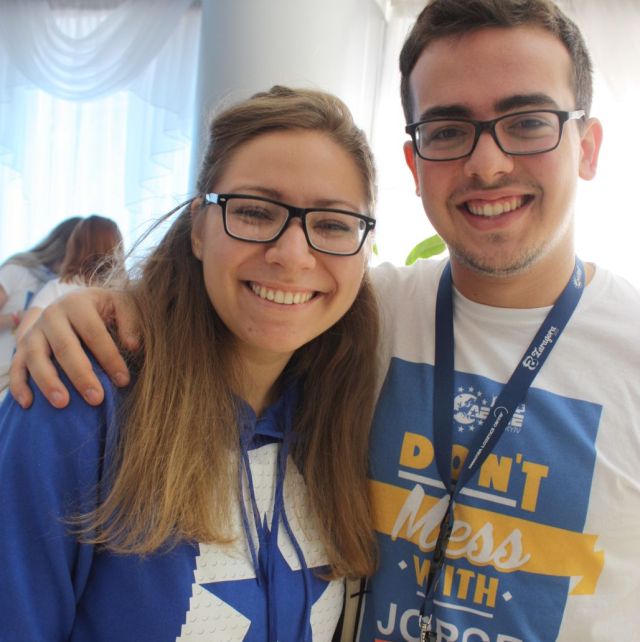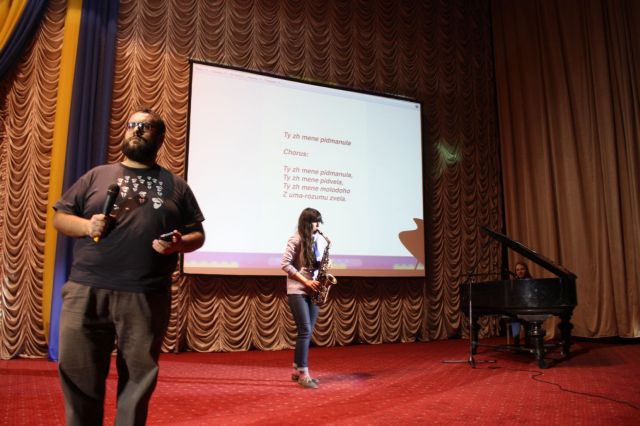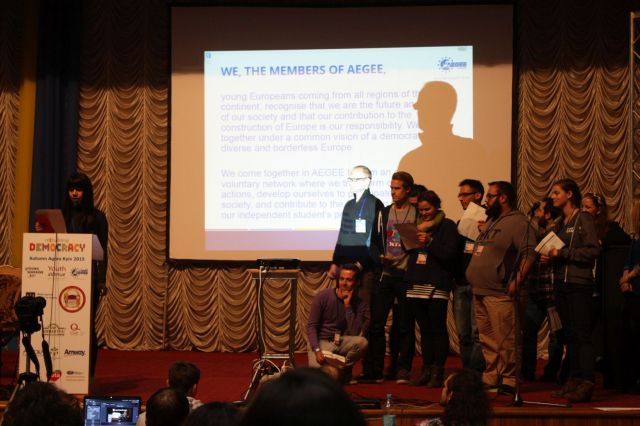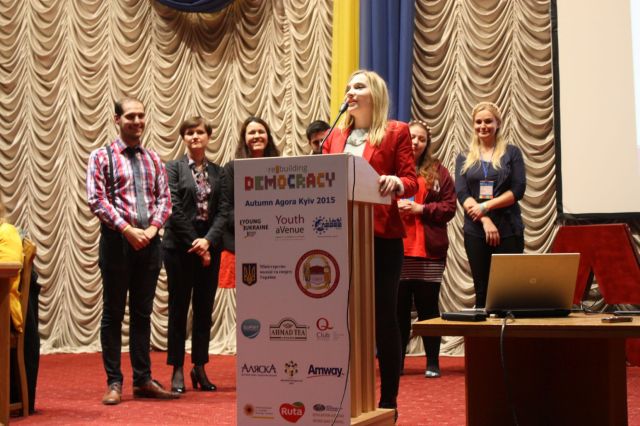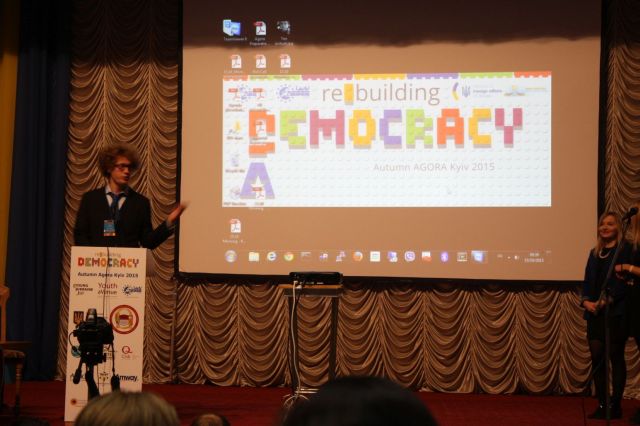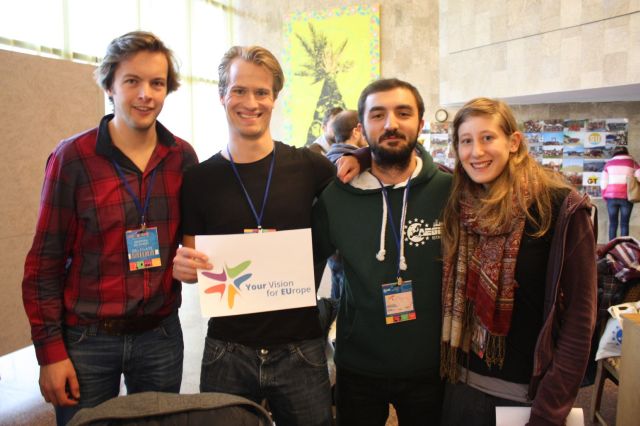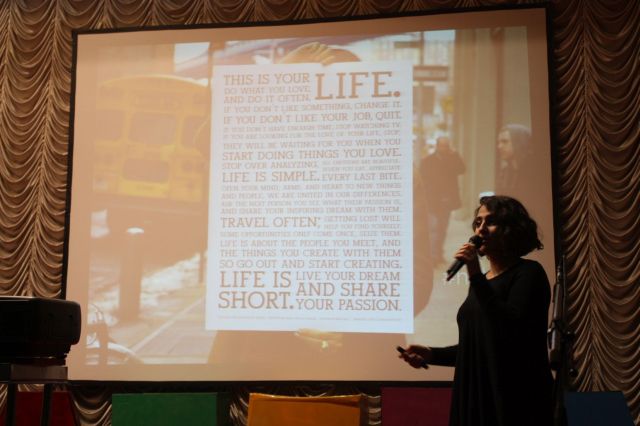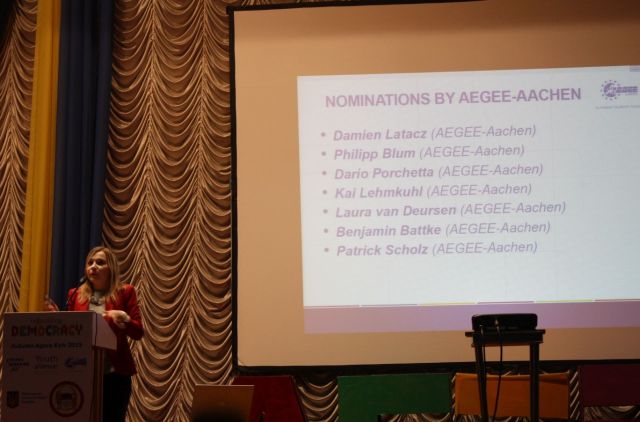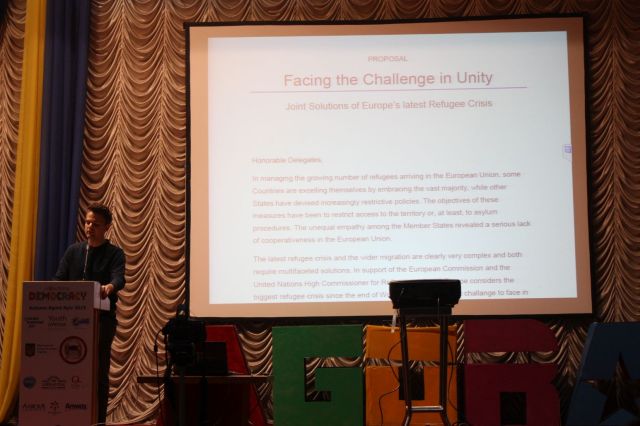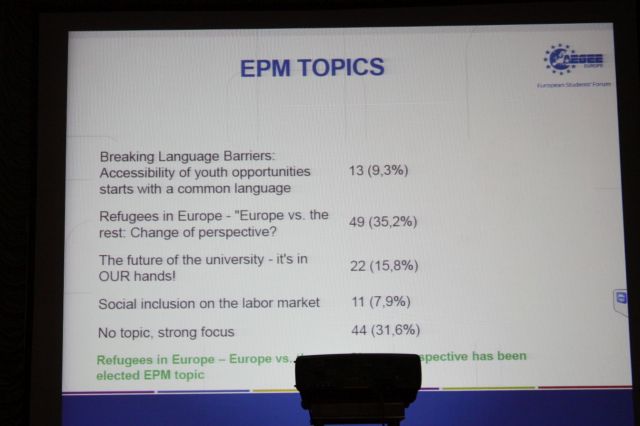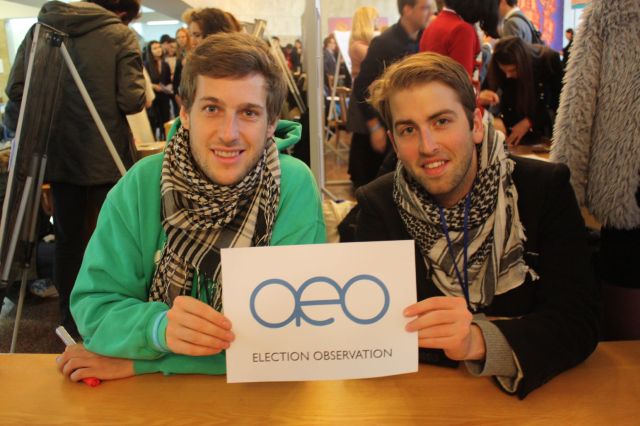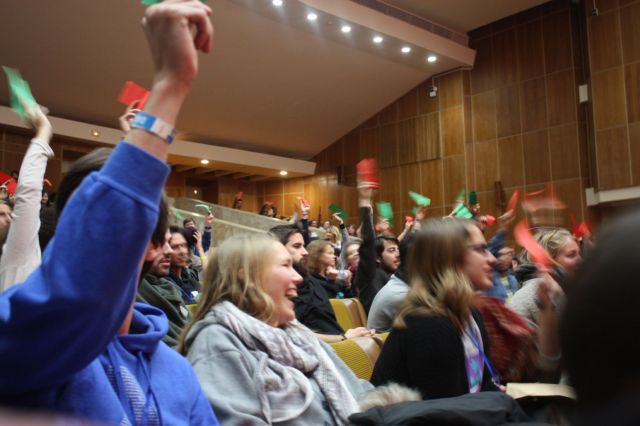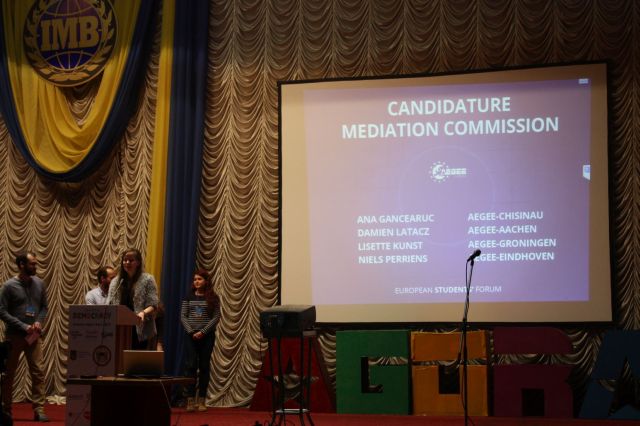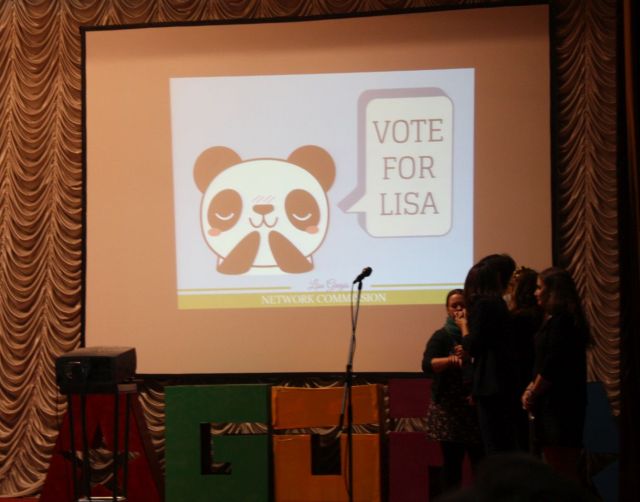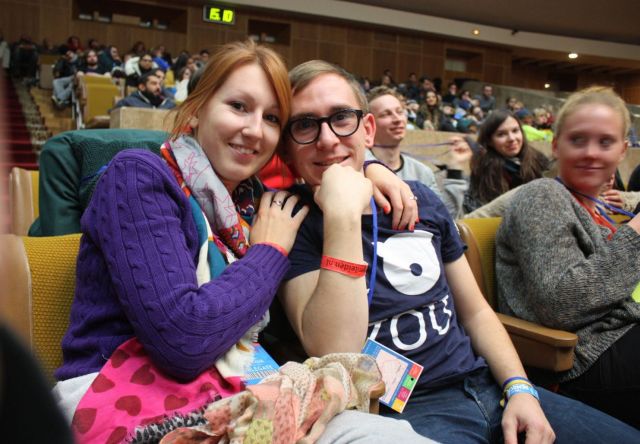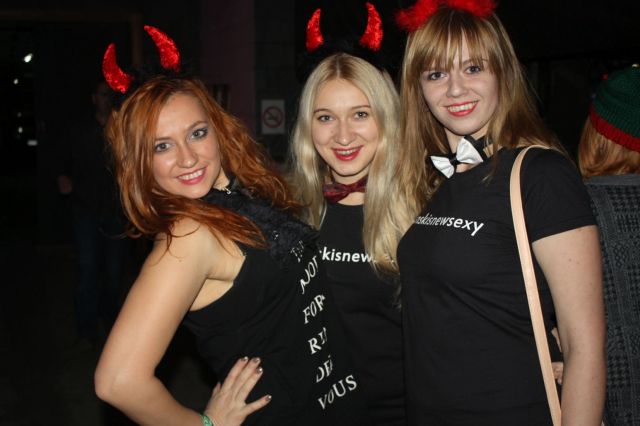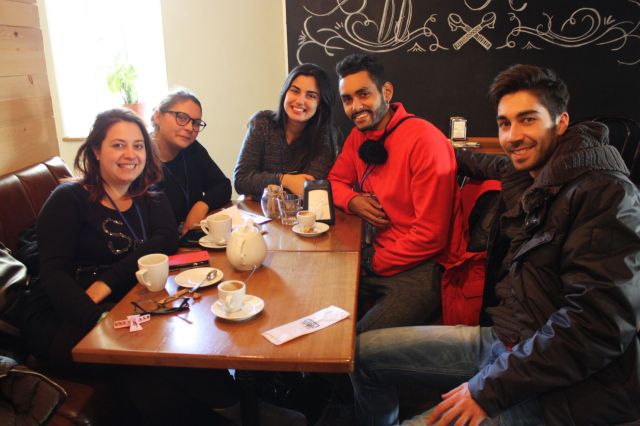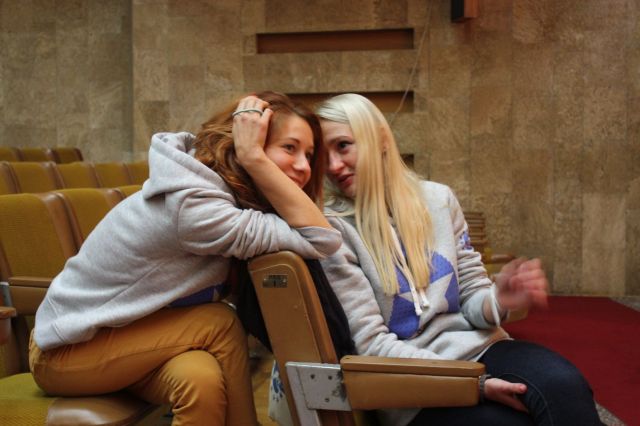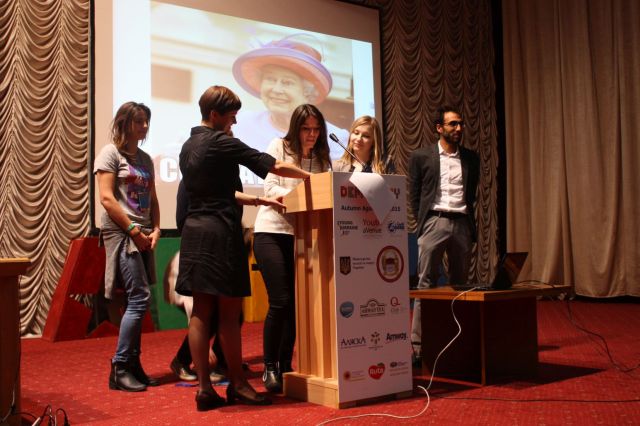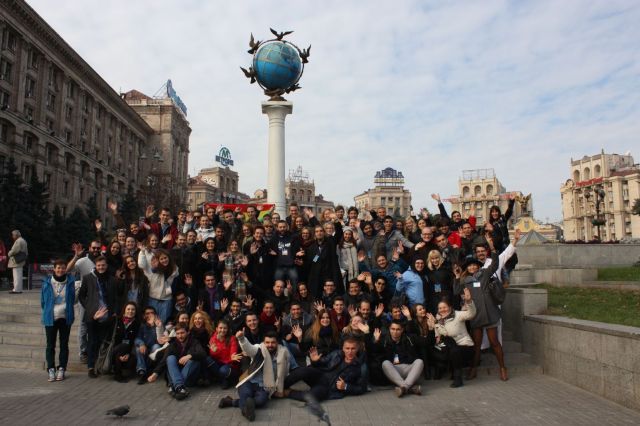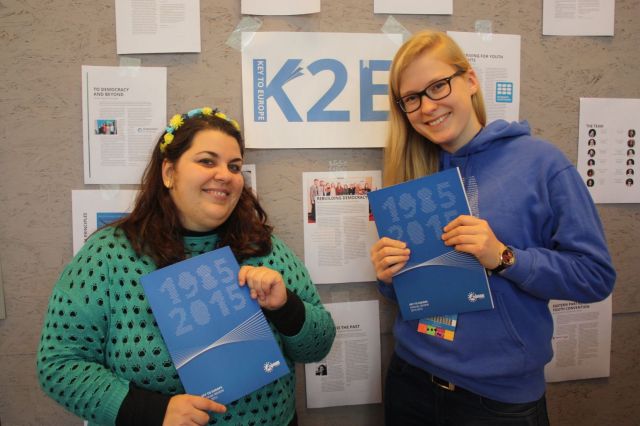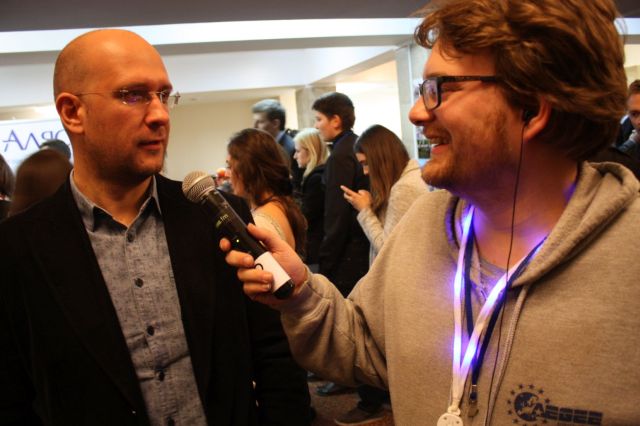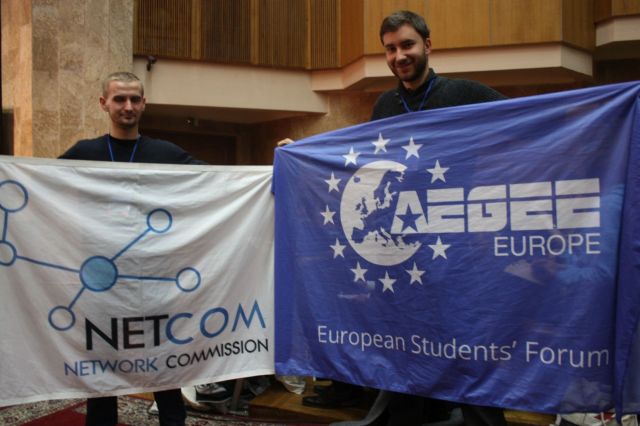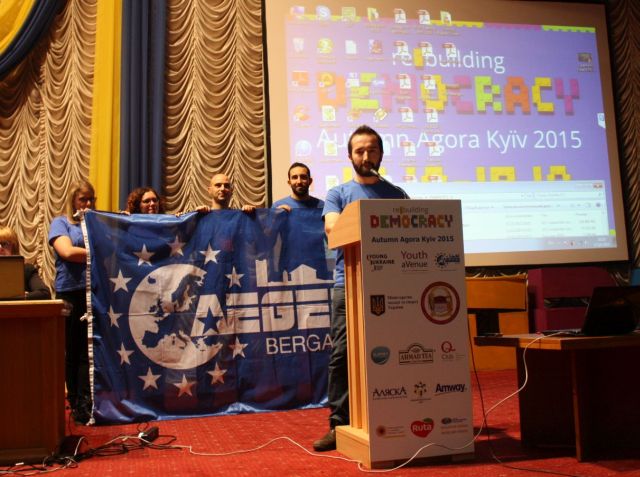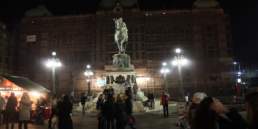The Agora in Kyiv was fantastic. The statutory event, which took place from 14th till 18th of October 2015, was well organized and offered a lot of excitement and fun. Moreover, it gave the 500 participants the great chance to get to know Ukraine better, a wonderful country which has been headlining the news with images of war and unrest in the past two years. Of course Kyiv was a safe place, as the organisers promised. The only unrest happened on the Agora stage, as the summary of this event shows.
1. Great pre-event in Kyiv
The first highlight of the Agora week took actually place right before the statutory event. On 13th of October AEGEE-Kyiv organized the conference “Young Ukraine”. The organisers around former CD member and Agora Chair Alla Resheten and Policy Officer Armenak Minasyants created an exciting programme with good speakers and three high-profile panels. These discussed the future of Ukraine from a political and economic point of view.
With this successful event, AEGEE-Kyiv revived the tradition of serious thematic pre-events by the hosting antennae, a tradition which dates back to the very first Agora in Munich in 1986. Unfortunately in recent years all other Agora pre-events were cultural and fun events by other antennae in the neighbourhood, so this event by the hosting local gave the Agora an additional great professional and serious touch.
It would be awesome if AEGEE continued another lost tradition: the Agora post-event. These two or three days – usually excursions – with a cultural topic gave the participants the chance to follow up on the Agora, to discuss new ideas and projects, to get to know each other better and to recover a bit from the sleepless Agora days before finally returning home. These events were normal in the past but then forgotten for roughly ten years. Agora Gijón offered such an event, let’s hope it becomes standard again too.
2. Awesome and many local organisers
This was definitely an Agora with very relaxed, competent and extremely professional organisers and helpers. Everything was arranged, there were always people around to approach, and logistics simply worked great. No wonder, this Agora had the best ratio between participants and organisers ever – with 150 helpers and organisers for 500 participants. Great job, people!
3. Fantastic main coordinator
Many people thought that her Facebook name Smailikova is her real surname – until this Agora. Main organizer Anna Pykhtina did an outstanding job in planning the Agora and directing this team – of course always with her trademark smile. Of course she was nervous before the event, but thanks to her professionalism everything went great. No wonder she got a lot of thanks and applause at the end of this event, after a very moving final speech of her. Anna Pykhtina is for sure a person with will achieve great things also in her life after AEGEE.
4. Grand stylish opening
Agora openings have become big ceremonies in the past years. Also the opening night in Kyiv was not a let-down – with the great speeches and cultural performances. Among others, singer Justin Galea from AEGEE-Valletta had the chance to sing a Ukrainian song. The whole opening was not as long as other ceremonies, only 45 minutes. This was done on purpose, because the organisers took into account the empty stomachs of the participants.
5. Reading out Statement of Principles
It was a big issue for many people at Agora Gijón: in spring the Statement of Principles was read out loud by everyone, while the whole Agora was standing. Many people felt reminded of a cult in those moments, while others loved it. However, since the opinions were so divided, the Chair and current CD came up with a widely appreciated new solution this time: different people read out one sentence each on stage.
6. Relaxed and honest new CD
This Agora was the first time the new CD around AEGEE-Europe President Ola Kluczka presented itself to a wide audience after its election in spring. The Agora appreciated the relaxed and honest approach of the Comité Directeur and approved its Activity Plan with an excellent 94.7 percent of all votes.
7. High approval also for the old CD
Nearly as many voted also in favour of the Activity Report of the previous CD, which was in office until summer: 90.6 percent, which is a great result. However, not many of the seven old CD members could witness the voting result, since only three showed up at the Agora for different reasons, including current AEGEE-Europe president Ola Kluczka.
8. Great Agora Fair
The Agora Fair is always a highlight, after all it is a true marketplace – or said with the Greek word: a real agora. Many projects, interest groups, the new working groups and other bodies presented themselves to a very curious and enthusiastic audience. The participants could get informed, play games or sign up for more information. However, while the AEGEE stands were packed with people, the desks of the universities, which presented themselves at the same time, were unfortunately not popular. Some people already expressed the idea that maybe it is time to rethink this part of the fair.
9. Agora Inspire is back
Agora participants love a good story, they want to get inspired. That’s why Agora Inspire was introduced two years ago: members tell stories about issues which are important to them. At Agora Gijón it was taken out of the programme, which many people regretted. Therefore it was added again to the Agora Kyiv agenda. However, since there was a parallel programme going on, not many people attended this very interesting session in the plenary hall.
10. The Honorary Members affair
It was one of the highlights of Agora Kyiv, a really big show. AEGEE-Aachen nominated seven of their own members for honorary membership. This was possible due to the regulations in the Honorary Members Charter, which was created last year. Before AEGEE had this Charter, only the CD could nominate people for honorary membership of AEGEE-Europe. Moreover, those nominees had to pay for their own trip. The Charter changed this: now every AEGEE body could suggest people, moreover, the trip of these nominees were reimbursed.
Former AEGEE-Aachen President Philipp Blum, one of the nominees, explained why his antenna suggested the seven people: “We told the previous CD to remove the reimbursement sentence, because it could mean that an antenna nominates all of their Agora participants for honorary membership and AEGEE-Europe would have to pay their trip. However, the old CD did not want to change the rule, so we acted.” The new CD was more open to that suggestion and supported the Agora proposal to remove the reimbursement – which passed.
Nonetheless, there was still the question what should happen with the seven nominees. Two of them were present in Kyiv: Philipp Blum and Damien Latacz, Philipp’s successor as AEGEE-Aachen President. Both of them turned down their nomination, because it was also in conflict with their Agora plans: Philipp candidated for the Summer University Coordination Team and Damien for the Mediation Commission. But what to do with the other five? After a few discussions the delegates voted and rejected the nominations.
11. Florian Hauger on stage
For many he was a true hero, some even nominated him for “Member of the Year” in the annual Golden Times review: Florian Hauger. The Secretary from AEGEE-Heidelberg, attending his very first Agora, went on stage with the suggestion that the Agora should make a statement regarding the refugee crisis. He even presented a draft by his antenna that he wanted to put forward to discussion in a workshop and for a vote in the plenary. However, he probably did not quite expect what happened next.
Several Agora participants went on stage and brought forward technical reasons why the Agora could not make such a vote. For example, it was explained that the Agora could not vote on statements, but only on position papers, but that a position paper would require a well-defined process which would take several months. Someone else said that in his opinion the Agora could not make such a vote, since the antennae could not discuss this beforehand. This argument was not valid, as the Juridical Commission (JC) pointed out: “You are here as delegates, so you act on behalf of your antennae. And you are confronted here with many amendments, motions and other things that you could not prepare for at home. This is all correct.” In all these turbulences, Florian Hauger stayed firm as a rock, did not get intimidated by the experienced members on stage and kept repeating into the microphone: “I still want to put this forward to a vote. The issue is very important.”
In the end, the Agora voted upon whether the Agora should vote upon such a refugees statement. Sounds crazy? Several people indeed thought so and expressed the opinion that AEGEE was drowning in bureaucracy. One delegated told the Golden Times: “If people don’t like the statement, they can vote against it. Voting about having a vote makes no sense.” Others appreciated the vote about the vote as a sign for living democracy in AEGEE. In the end, the majority was against having this vote.
For sure this issue will be discussed again at the next Agora, since AEGEE-Europe appointed a Policer Officer on Migration in December: Luca Bisighini from AEGEE-Brescia.
12. The EPM Leiden 2016 topic
The refugees matter returned, when the Agora voted upon the topic for the upcoming European Planning Meeting (EPM) in Leiden. “Refugees in Europe” was one of five suggested topics and got most votes, just a few votes ahead of the runner-up topic: “No topic, just strong focus on the Action Agenda”. Some people did not like the way the topic was decided, went to stage and requested a vote between the two topics with the most votes. The reason: they wanted to have a topic which is legitimated with an absolute majority, not just a relative majority. There was again a lot of confusion and very heated discussion, because the statutes of AEGEE don’t specify the type of majority needed in this case. Some people said in this case relative majority would suffice, because a majority is a majority.
All this happened very late in closing plenary of the Agora. Time was running out and there were still quite some agenda items ahead. The local organisers got very nervous and expressed their concern that all people would be kicked out soon. Nevertheless, in the end the Chair granted a vote between the two topics with indicative ballots: the delegate had to loft either a green or a red piece of paper. The result, however, was too close to tell. So the delegates had to vote by roll-call. Which of course took a pretty long time. In the end the decision was the same, just the legitimation stronger: the absolute majority was in favour of the topic “Refugees in Europe”.
13. AEGEE and the matter of European issues
Some people considered the debate about the refugee statement unworthy, since AEGEE was founded to be the students voice regarding current issues in Europe. This indeed does not only cover students-related issues such as youth unemployment or higher education, but all topics that have an effect on the European integration process. In the past AEGEE dealt with a lot more current issues with the help of European projects, consisting of international conferences and other activities. Those have become less over time.
So how did AEGEE deal with the big topics? In general, in 2015 there were four major European issues: the political and military conflict between Russia and Ukraine, the Euro crisis and in connection the economic crisis in Greece, the refugee crisis and since November also terrorism.
The first one was tackled at EPM Burgos and an event series by AEGEE-Kyiv, but not much else. The second topic was not in the focus of many AEGEE activities either. The third one – refugees – might become a big issue in 2016; so far AEGEE had several local events about it in the network and it will be the main topic at EPM Leiden. However, this alone doesn’t guarantee yet that it will get the attention in AEGEE that it has now in media, politics and society – after all, the relationship between Russia-Ukraine was not much reflected in the network after being the EPM Burgos topic either. This required more concrete activities and fast action. Despite the lack of projects dealing with current issues, there is still a bright side: the Election Observation Project is still going strong. Also in 2015 they went to many countries, among others Ukraine, and brought a lot of impressions back to the network.
14. Most proposals passed
In general, it was pretty smooth Agora for people who made proposals. Most of them passed, for example, that the Agora should elect the Working Group coordinators instead of letting the CD decide in a top-down management style. Two proposals failed. The first was about removing the CD member as observer of the Juridical Commission (JC). The JC itself made the proposal and explained why: they are approached regularly by people who have sensitive questions; some of these people approach a JC member personally instead of writing to the official communication channel Juridical-L, because they don’t want the CD to read this mail.
During the prytannium this issue was dealt with in a rather technical way, it was regarded as a matter of communication tools mainly. At the same time the CD stressed that they are just there to support, observe and help, and they could only do it with being an observer to the JC. The Agora voted in favour of the proposal with a relative majority, but not with the required two-third majority, therefore it failed. Maybe the outcome would have been different if the JC had not presented the issue as a matter of communication, but of trust and confidentiality. After all, some people saw this as the main problem.
Another major rejected proposal dealt with the suggestion that proposals should only be made at spring Agoras. The idea behind: this would give the Agora more time to spend on projects and ideas instead of commas in the statutes. Also here quite some comments were negative, because many people felt this would limit the power of the members to develop the association.
15. Good IT support for voting
Agoras become increasingly technical. Most of the votings take place via computer. This worked very well in Kyiv, since the local organisers provided a big room with computers in the plenary building and also computers at the gym. Well done! It will be interesting to see how the technical infrastructure will look like at Agora Bergamo, when voting via “EUth” will be implemented. This is a tool for mobile and digital youth participation in Europe, supported by the European Union. Time is quite short to implement it, but AEGEE is keen on doing so.
16. Elections, part I: The surprise MedCom
The Mediation Commission is a body which often attracts last-minute candidates. The same happened in Kyiv. Until the original application deadline, only one person applied for one of the four MedCom positions. Right until the Agora pre-event in Chisinau. Four people – three participants and one organizer – were concerned about this lack of interest in the MedCom and decided to step up. These were: Damien Latacz from Aachen, Niels Perriens from Eindhoven, Lisette Kunst from Groningen and Ana Gancearuc from Chisinau. They candidated together on stage, stressing that they had the idea together and want to help AEGEE. The Agora appreciated it and voted in favour of all four of them.
17. Elections, part II: Tough questions to the Netcom
The delegates were very active and critical during the question time for the candidates. This is good, because in the past there were also Agoras which did not care very much about asking question to the new European AEGEE personnel. Among others, the seven candidates for six Netcom positions faced a lot of thorough scrutiny. Especially a Dutch girl received a lot of questions, but also the two Italian candidates. In the end it was like many people expected: while one Italian – Lisa Gregis – got the strongest result, the other one was the only candidate not being elected.
18. Elections, part III: The SUCT couple
Six people competed for the four spots in the Summer University Coordination Team (SUCT). Among there were Lucia, at that time President of AEGEE-Bratislava, and her boyfriend Philipp Blum from AEGEE-Aachen. They are without doubt the most famous and popular AEGEE couple at present. Since this autumn they live together in Aachen. Both were elected, with Philipp scoring the best voting result. Nevertheless, being a true gentleman he let Lucia become SUCT Manager. The team is completed by Yevgeniya Gagarkina from Kyiv and Carolina Alfano from Salerno, who was elected despite the fact that she could not be in person at the Agora – which is actually quite rare!
19. AEGEE-Catania does it again
If an antenna is voted once “best SU organizer”, then they might have just had easy-to-please participants. If they win the title twice, it still might be a coincidence. But four times in a row? Then there must be more to it. AEGEE-Catania managed this miracle. They got by far the best grades from their participants in the evaluations this year. Next to a perfect programme, also fantastic locations and the welcoming spirit and professional organizing skills of the antenna were the key to the success.
20. Big distances
While the plenary building was nicely located in the centre, the gym was far away – to be precise: a 40-minutes bus ride from downtown Kyiv. Quite some distance. In honour of the antenna one must add that they provided a good bus shuttle service.
21. Nice Parties
The themes of the Agora parties were “Suit Up”, “Awkward”, “European Night” and of “Visual Identity”. The parties were good. Most of the locations were very interesting, but due to the long commuting some people skipped the parties. There was also an alternative cultural programme. However, it’s not quite sure whether a film night with Ukrainian movies on quite a small screen are considered to be a top alternative. Something to work on for future Agora organisers.
22. Small portions and extra rations
An Agora is a huge logistical challenge on a very small budget. This often also means: small food rations. One cannot always do it like AEGEE-Amsterdam in 2002, when they gave a “brunch package” with a couple of sandwiches in the morning and simply skipped lunch for cost reasons – a perfect recipe to make yourself very unpopular as organizer. In Kyiv there was food three times per day, but the portions were not really big, with the consequence that after the official lunch quite some participants got themselves an extra lunch in a nearby café.
23. Ukrainian-Russian friendship
“You go to Kyiv? That’s dangerous”. Probably you heard this from family or friends before the event, if you were one of the Agora participants. After the event you could not only tell them that you were perfectly save, but also this: “Many Russians and Ukrainians worked together as friends in the great Agora team.” Also among the participants you saw many examples of the great Ukrainian-Russian friendship in our association. After all, being in AEGEE means living the dream of a perfect Europe.
24. AEGEE-Canterbury
At every Agora new AEGEE Contacts sign the famous Convention d’Adhesion, while the Agora sings the accompanying song. This time among others AEGEE-Canterbury became Contact Antenna. Another local, which had signed the Convention a few months ago, was denied the affirmation by the Agora: the new local in Hatay, a Turkish place close to the Syrian border, had forgotten to send in its Activity Plan. Now they have to wait for ratification till May until they are officially an AEGEE local – not really the most motivating situation. Of course, the Contact made the mistake, but for new people dealing with the AEGEE bureaucracy is not so easy. In times of a shrinking network a tiny bit more support would be good. After all, what were telephones invented for? A personal word beats e-mails every time.
25. Shrinking network
AEGEE is shrinking. Not fast, but a tiny bit. After Agora Gijón in spring 2015 AEGEE had 156 Antennae, 21 Contact Antennae and 10 Contacts. After Agora Kyiv it was like this: 154 Antennae, 14 Contact Antennae and 9 Contacts. This means: AEGEE needs to make better marketing. This should not be hard, because there are currently more than 20 million students in the EU alone, plus many millions in the other European countries. A country like Turkey for example has 4 million students. Moreover, in many European countries the number of university students is on the rise – let’s take Germany for an example: in 2005, the number of university students was 1.99 million. This autumn it was 2.76 million – that’s an increase by nearly 40 percent in just ten years. AEGEE has to find a way how to position itself better on the market of students associations. The fact that euroscepticism, nationalism and xenophobia is on the rise should give AEGEE the chance to position itself as the association, which fights against these bad tendencies and offers a vision of a better Europe.
26. The 30th Anniversary goes on…
AEGEE’s annual review, the Key to Europe, is a great tool to explain the association’s vision of a better Europe. At the Agora the team around editor-in-chief Erika Bettin (on the left in the photo), presented the 30th Anniversary Edition of the beloved yearbook. It was not the only time that the big birthday year of AEGEE was celebrated. The CD gave a short history review on stage and the organisers of the “Night Of the 7 Antennae” events in April gave a detailed account about their great contribution to the anniversary year.
27. Hemmo’s radio
Meanwhile, Hemmo de Vries, chief editor of the Internet radio station AEGEE.fm, reported from his Agora studio with his team: Eric Luckner, Alya Vykhodtseva and Luc van den Elzen. Hemmo, famous for his weekly radio shows, was satisfied with his Agora studio in general, but he thinks AEGEE.fm could have achieved more if they had had a better Internet connection. Despite the fact that the audience was quite small, this is the way to go: professional Agora coverage – maybe even with radio, TV and a news portal about the general assembly.
28. Lots of Polar bears
Finally, we come to the small bits that add a bit of flavor to the Agora. For example the huge group of AEGEE-Aachen polar bears! They seemed to be everywhere and always created perfect photo opportunities.
29. Many stolen flags
Some antennae don’t bring their flag to an Agora anymore. They are simply afraid it might et stolen. This is totally understandable, because there were flag hunters everywhere. Especially AEGEE-Kraków was successful. The amazing antenna stole several flags, among others the AEGEE-Europe flag and the NetCom flag.
30. The Agora returns in Bergamo
AEGEE-Bergamo will host the next Agora, which will take place from the 18th till the 22nd of May 2016. The main organizer, Paolo Ghisleni, was among the Kyiv helpers in order to get a good impression what an Agora means. However, usually the CD announces also the host of the following Agora as well, in this case: the host of Autumn Agora 2016. But: no one applied. This is a rare case, since there are usually between two and four antennae applying. In any case there is no reason to panic, because this type of situation usually gives those antennae the final push who always wanted to organize this event. During Agora Kyiv AEGEE-Ankara was thinking very loudly about it, but in the end it was AEGEE-Chisinau, which used the extended deadline in November to apply. An Agora in the Republic of Moldova is definitely a very good choice, since it will give the participants the great chance to discover a beautiful, but also torn country. Just like Agora Kyiv gave the chance to explore wonderful Ukraine.
Click here for:


